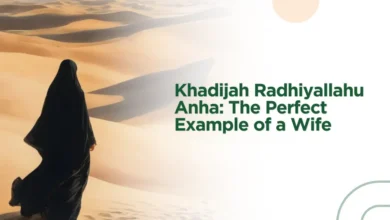Eid al-Fitr: Returning to Breaking the Fast and Maintaining Faith After Ramadan
Muslims around the world joyfully celebrate Eid al-Fitr one of the most important Islamic holidays. Nevertheless it is important to comprehend the actual significance of Eid al-Fitr and how we ought to behave once the celebration is over. Eid al-Fitr contrary to popular belief literally means returning to breaking the fast following a month-long fast not returning to purity. Additionally Eid al-Fitr ought to act as a catalyst for us to keep fostering and fortifying our faith after Ramadan is over.
The Mean behind Name Eid al-Fitrs
The Arabic phrase ‘Eĩd(عيد) and al-Fiṭr(الفطر) is where the phrase Eid al-Fitr originates. Fiṭr is derived from faṭara(فطر) which means to break the fast or to end fasting whereas ‘Eĩd means festival or celebration. Eid al-Fitr then literally means the festival of breaking the fast. On this day Muslims break their fast during Ramadan and start eating and drinking normally again. The original meaning of Fiṭr in Eid al-Fitr is more closely associated with breaking the fast despite the fact that many people believe it is related to fitrah which means purity or innate nature. The idea that fasting during the month of Ramadan purges sins and returns people to their original state may be the source of this misconception. Although fasting has significant spiritual benefits the idea of purity is not specifically mentioned in the original meaning of Eid al-Fitr.
Eid al-Fitrs Spiritual Significance
The literal meaning of Eid al-Fitr is returning to breaking the fast but this does not lessen its spiritual significance. During Eid al-Fitr people take time to worship Allah ﷻ for a month-long journey of fasting. The goal of the Ramadan fast is to increase piety purify the soul and get closer to Allah ﷻ. Thus after overcoming the challenge of self-control during Ramadan Eid al-Fitr also represents a spiritual triumph. Eid al-Fitr is also an occasion to deepen familial ties ask for forgiveness and spread happiness to others. Giving to those in need is important as demonstrated by customs like paying Zakat al-Fitr before the Eid prayer. This illustrates that Eid al-Fitr has profound social and spiritual significance in addition to being a physical celebration.
Also read:What Should We Do Before and After Eid Fitri?
Eid al-Fitr marks a new beginning rather than the end
Many people view Eid al-Fitr as the finish line at the end of a spiritual marathon that takes place during Ramadan. On the contrary it ought to be seen as the beginning point for carrying on the virtues that were established during Lent. Ramadan serves as a time of intense self-discipline worship and heart purification. The difficulty comes in preserving and even enhancing these accomplishments after Eid al-Fitr. In the Quran Allah ﷻ stated:
And worship your Lord until the certainty (death) comes to you.(Surah Al-Hijr: 99).
This verse serves as a reminder that piety and worship should be a lifelong habit not just something we do during Ramadan. We must thus continue to be consistent in our acts of worship after Eid al-Fitr including timely prayers Quranic reading charitable giving and good deeds.
Keeping the Faith After Ramadan
There is often a temptation to fall back on old routines after Ramadan is over. For instance skipping nightly prayers, reciting the Quran less frequently or becoming negligent in performing good deeds. We can take a few actions to keep our faith intact. First and foremost we need to keep up the worship routines we developed during Ramadan. If we were used to reciting the Quran, doing Tarawih prayers and participating in dhikr during Ramadan we can substitute these activities with regular Sunnah prayers, daily Quran recitation or going to religious events after Ramadan. Worshiping consistently is essential to preserving faith. Secondly, we do we must keep learning and keep Allah in mind. Since faith can waver we must always remember Allah ﷻ and enlarge our hearts with knowledge. Our faith can be strengthened through listening to sermons reading Islamic literature and attending religious lectures. Through consistent worship and ongoing spiritual development we can make sure that our faith endures beyond Ramadan.
Also read:The Meaning of Eid al-Fitr in Making Financial Hijrah
Eid al-Fitr: A Spark for Transformation
The momentum of Eid al-Fitr ought to be a catalyst for constructive life transformation. We must promise not to revert to our bad habits such as being angry, being lazy or being wasteful after Eid al-Fitr if we were able to break them during Ramadan. Both the hereafter and our earthly lives will benefit from this shift. This lesson serves as a reminder that true wisdom is found in the capacity to uphold moral principles and faith throughout our lives not just during Ramadan.
In Conclusion
For Muslims, the holiday of Eid al-Fitr is a time of joy and significance. Eid al-Fitr literally translates to returning to breaking the fast following a month-long fast not returning to purity as it is sometimes misinterpreted. Eid al-Fitr should also mark the start of an ongoing endeavor to deepen piety and faith. We must continue the positive habits we have formed during Ramadan and work to improve ourselves after it is over. In this way Eid al-Fitr becomes more than just a transient holiday it becomes a means of gaining Allah ﷻ’s blessing in our day-to-day existence. Since our spiritual journey never ends lets use Eid al-Fitr as motivation to keep growing in our faith and deeds.
Also read:Is Istighfar Related to Sustenance and Blessings from Allah ﷻ ?

Let’s Visit, Zeed and join for halal investment with Zeed.
References
- Mawdoo3. (n.d.). لماذا سمي عيد الفطر بهذا الاسم؟. Retrieved from https://mawdoo3.com/%D9%84%D9%85%D8%A7%D8%B0%D8%A7_%D8%B3%D9%85%D9%8A_%D8%B9%D9%8A%D8%AF_%D8%A7%D9%84%D9%81%D8%B7%D8%B1_%D8%A8%D9%87%D8%B0%D8%A7_%D8%A7%D9%84%D8%A5%D8%B3%D9%85
- Marefa. (n.d.). عيد الفطر. Retrieved from https://www.marefa.org/%D8%B9%D9%8A%D8%AF_%D8%A7%D9%84%D9%81%D8%B7%D8%B1
- Elbalad. (n.d.). لماذا سمي عيد الفطر بهذا الاسم؟. Retrieved from https://www.elbalad.news/4334798
- Almandab. (n.d.). لماذا سمي عيد الفطر بهذا الاسم؟. Retrieved from https://almandab.com/%D9%84%D9%85%D8%A7%D8%B0%D8%A7-%D8%B3%D9%85%D9%8A-%D8%B9%D9%8A%D8%AF-%D8%A7%D9%84%D9%81%D8%B7%D8%B1-%D8%A8%D9%87%D8%B0%D8%A7-%D8%A7%D9%84%D8%A7%D8%B3%D9%85#google_vignette







